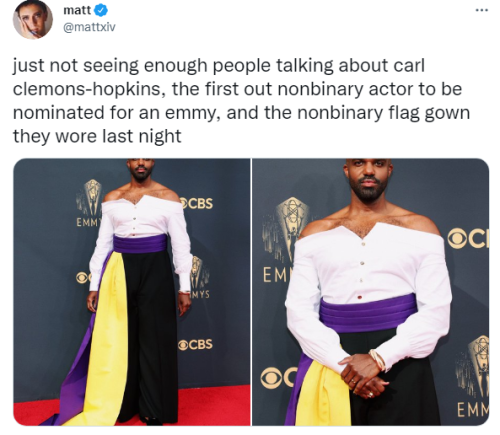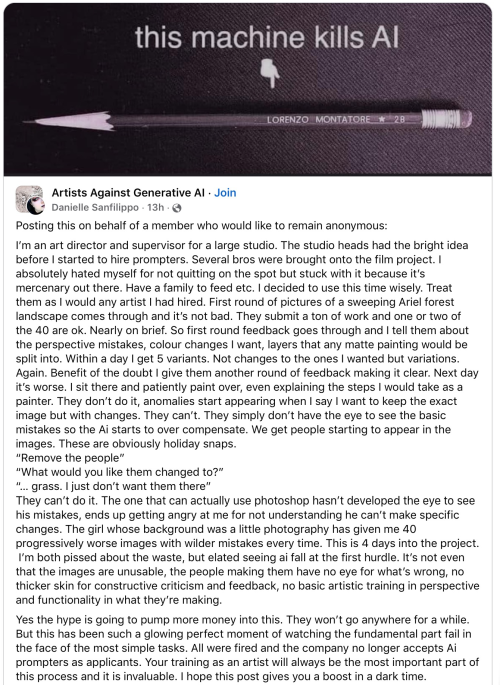Mothymyths - Mothy Myths Studios
More Posts from Mothymyths and Others
Since I’ve seen a lot of discussion about vandalizing Cybertrucks and Tesla plants to highlight Elon’s horrible everything including his increasing white supremacism, I cannot tell my fellow Gentiles enough to hold off on the swastikas. Yes I know that when you spray paint that on a Cybertruck what you’re saying is “your car is a Nazi car! You bought that from a Nazi!” but here’s the problem: you know who else likes to spray paint swastikas on stuff? Actual Nazis. And a random Jewish person won’t necessarily know the difference. So since there are infinite other ways to communicate that someone is a Nazi, you don’t need to include a swastika in there. If you’re legitimately anti-Nazi you care enough about Jews not to risk that.

"The state, which has long ranked worst in the US for child wellbeing, became the first and only in the country to offer free childcare to a majority of families
There was a moment, just before the pandemic, when Lisset Sanchez thought she might have to drop out of college because the cost of keeping her three children in daycare was just too much.
Even with support from the state, she and her husband were paying $800 a month – about half of what Sanchez and her husband paid for their mortgage in Las Cruces, New Mexico.
But during the pandemic, that cost went down to $0. And Sanchez was not only able to finish college, but enroll in nursing school. With a scholarship that covered her tuition and free childcare, Sanchez could afford to commute to school, buy groceries for her growing family – even after she had two more children – and pay down the family’s mortgage and car loan.
“We are a one-income household,” said Sanchez, whose husband works while she is in school. Having free childcare “did help tremendously”.
...Three years ago, New Mexico became the first state in the nation to offer free childcare to a majority of families. The United States has no federal, universal childcare – and ranks 40th on a Unicef ranking of 41 high-income countries’ childcare policies, while maintaining some of the highest childcare costs in the world. Expanding on pandemic-era assistance, New Mexico made childcare free for families earning up to 400% of the federal poverty level, or about $124,000 for a family of four. That meant about half of New Mexican children now qualified.
In one of the poorest states in the nation, where the median household income is half that and childcare costs for two children could take up 80% of a family’s income, the impact was powerful. The state, which had long ranked worst in the nation for child wellbeing, saw its poverty rate begin to fall.
As the state simultaneously raised wages for childcare workers, and became the first to base its subsidy reimbursement rates on the actual cost of providing such care, early childhood educators were also raised out of poverty. In 2020, 27.4% of childcare providers – often women of color – were living in poverty. By 2024, that number had fallen to 16%.
During the state’s recent legislative session, lawmakers approved a “historic” increase in funding for education, including early childhood education, that might improve those numbers even further...
When now-governor Michelle Lujan Grisham announced her candidacy in late 2016, she emphasized her desire to address the state’s low child wellbeing rating. And when she took office in January 2018, she described her aim to have a “moonshot for education”: major investments in education across the state, from early childhood through college.
That led to her opening the state’s early childhood education and care department in 2019 – and tapping Groginksy, who had overseen efforts to improve early childhood policies in Washington DC, to run it. Then, in 2020, Lujan Grisham threw her support behind a bill in the state legislature that would establish an Early Childhood Trust Fund: by investing $300m – plus budget surpluses each year, largely from oil and gas revenue – the state hoped to distribute a percentage to fund early childhood education each year.
But then, just weeks after the trust fund was established, the World Health Organization declared Covid-19 a pandemic.
“Covid created a really enormous moment for childcare,” said Heinz. “We had somewhat of a national reckoning about the fact that we don’t have a workforce if we don’t have childcare.”
As federal funding flooded into New Mexico, the state directed millions of dollars toward childcare, including by boosting pay for entry-level childcare providers to $15 an hour, expanding eligibility for free childcare to families making 400% of the poverty level, and becoming the first state in the nation to set childcare subsidy rates at the true cost of delivering care.
As pandemic-era relief funding dried up in 2022, the governor and Democratic lawmakers proposed another way to generate funds for childcare – directing a portion of the state’s Land Grant Permanent Fund to early childhood education and care. Like the Early Childhood Trust Fund, the permanent fund – which was established when New Mexico became a state – was funded by taxes on fossil fuel revenues. That November, 70% of New Mexican voters approved a constitutional amendment directing 1.25% of the fund to early childhood programs.
By then, the Early Childhood Trust Fund had grown exponentially – due to the boom in oil and gas prices. Beginning with $300m in 2020, the fund had swollen to over $9bn by the end of 2024...
New Mexico has long had one of the highest “official poverty rates” in the nation.
But using a metric that accounts for social safety net programs – like universal childcare – that’s slowly shifting. According to “supplemental poverty” data, 17.1% of New Mexicans fell below the federal “supplemental” poverty line from 2013 to 2015 (a metric that takes into account cost of living and social supports) – making it the fifth poorest state in the nation by that measure. But today, that number has fallen to 10.9%, one of the biggest changes in the country, amounting to 120,000 fewer New Mexicans living in poverty.
New Mexico’s child wellbeing ranking – which is based heavily on “official poverty” rankings – probably won’t budge, says Heinz because “the amount of money coming into households, that they have to run their budget, remains very low.
“However, the thing New Mexico has done that’s fairly tremendous, I think, is around families not having to have as much money going out,” she said.
During the recent legislative session, lawmakers deepened their investments in early childhood education even further, approving a 21.6% increase of $170m for education programs – including early childhood education. However, other legislation that advocates had hoped might pass stalled in the legislature, including a bill to require businesses to offer paid family medical leave...
In her budget recommendations, Lujan Grisham asked the state to up its commitment to early childhood policies, by raising the wage floor for childcare workers to $18 an hour and establishing a career lattice for them. Because of that, Gonzalez has been able to start working on her associate’s in childhood education at Central New Mexico Community College where her tuition is waived. The governor also backed a house bill that will increase the amount of money distributed annually from the Early Childhood Trust Fund – since its dramatic growth due to oil and gas revenues.
Although funding childcare through the Land Grant Permanent Fund is unique to New Mexico – and a handful of other states with permanent funds, like Alaska, Texas and North Dakota – Heinz says the Early Childhood Trust fund “holds interesting lessons for other states” about investing a percentage of revenues into early childhood programs.
In New Mexico, those revenues come largely from oil and gas, but New Mexico Voices for Children has put forth recommendations about how the state can continue funding childcare while transitioning away from fossil fuels, largely by raising taxes on the state’s wealthiest earners. Although other states have not yet followed in New Mexico’s footsteps, a growing number are making strides to offer free pre-K to a majority of their residents.
Heinz cautions that change won’t occur overnight. “What New Mexico is trying to do here is play a very long game. And so I am not without worry that people might give it five years, and it’s been almost five years now, and then say, where are the results? Why is everything not better?” she said. “This is generational change” that New Mexico is only just beginning to witness as the first children who were recipients of universal childcare start school."
-via The Guardian, April 11, 2025

for the love of god please listen to old users when we say this site works differently. that you can’t just sit around with a blank blog. make posts or reblog, but do something at least. this site works because we don’t have an unavoidable garbage algorithm forcefeeding us posts based on our likes. we do not need another fucking twitter, tiktok or instagram.

don't give up

letter from a mother of a gay man. sent to ONE magazine, 1958.
--
This post was flagged as adult content and the original poster was deactivated so I'm bringing it back.

"just not seeing enough people talking about carl clemons-hopkins, the first out nonbinary actor to be nominated for an emmy, and the nonbinary flag gown they wore last night"
@mattxiv
Carl Clemons-Hopkins on IMDB


Australia has committed to elevating Aboriginal and Torres Strait Islander knowledge as one of five national priorities in science and research. This comes as part of the National Science Statement released on Monday by the Minister for Industry and Science, Ed Husic. The statement signals the national priorities that will shape investment and policy across research and development over the next decade. Australian research already punches above its weight. The statement notes we produce 3.4% of the world's research with just 0.33% of the world's population. So how can we accelerate our impact? Indigenous knowledge systems are a national strength. The history of science on this continent is extraordinary, yet we often fail to recognize the sophisticated knowledges held by our First Nations peoples. Indigenous voices must be at the table. The first peoples, the first scientists Aboriginal and Torres Strait Islander peoples were the first astronomers, physicists, biologists and pharmacists on this continent. From as far back as 65,000 years, Indigenous people have been integrating knowledge systems with and for people and Country. There are many examples of Indigenous knowledge contributing to contemporary problems. Traditional Aboriginal burning takes into account local weather conditions, plants, environments and animals. It shows how plants react to fire, how to reduce the risk of major fire events, and support regeneration and biodiversity. Indigenous-led approaches to urban water are pointing towards more sustainable water management practices that also regenerate ecological and cultural environments.
continue reading
What could have been if First Nations hadn't immediately been dismissed is savages.
This machine kills AI

-
 stinkypantsthe1st reblogged this · 1 month ago
stinkypantsthe1st reblogged this · 1 month ago -
 stinkypantsthe1st liked this · 1 month ago
stinkypantsthe1st liked this · 1 month ago -
 quantumcretin reblogged this · 1 month ago
quantumcretin reblogged this · 1 month ago -
 goldenresonance reblogged this · 1 month ago
goldenresonance reblogged this · 1 month ago -
 im-a-fucking-dumbass liked this · 1 month ago
im-a-fucking-dumbass liked this · 1 month ago -
 hyper-dragon reblogged this · 1 month ago
hyper-dragon reblogged this · 1 month ago -
 acrushonesmeralda reblogged this · 1 month ago
acrushonesmeralda reblogged this · 1 month ago -
 toasterdammerung liked this · 1 month ago
toasterdammerung liked this · 1 month ago -
 kokoibean liked this · 1 month ago
kokoibean liked this · 1 month ago -
 justakidicarus liked this · 1 month ago
justakidicarus liked this · 1 month ago -
 dragonspleenistasty reblogged this · 1 month ago
dragonspleenistasty reblogged this · 1 month ago -
 gay-panic-in-a-bottle reblogged this · 1 month ago
gay-panic-in-a-bottle reblogged this · 1 month ago -
 slickskullshock liked this · 1 month ago
slickskullshock liked this · 1 month ago -
 nuvanei liked this · 1 month ago
nuvanei liked this · 1 month ago -
 speedywhippet reblogged this · 1 month ago
speedywhippet reblogged this · 1 month ago -
 snek-amiga reblogged this · 1 month ago
snek-amiga reblogged this · 1 month ago -
 snek-amiga liked this · 1 month ago
snek-amiga liked this · 1 month ago -
 speedywhippet liked this · 1 month ago
speedywhippet liked this · 1 month ago -
 beautifuldreamlandgladiator liked this · 1 month ago
beautifuldreamlandgladiator liked this · 1 month ago -
 eepybubble reblogged this · 1 month ago
eepybubble reblogged this · 1 month ago -
 eepybubble liked this · 1 month ago
eepybubble liked this · 1 month ago -
 tobisaurus liked this · 1 month ago
tobisaurus liked this · 1 month ago -
 howils liked this · 1 month ago
howils liked this · 1 month ago -
 fvckw4d reblogged this · 1 month ago
fvckw4d reblogged this · 1 month ago -
 boomgun liked this · 1 month ago
boomgun liked this · 1 month ago -
 iwillflyoutofhere reblogged this · 1 month ago
iwillflyoutofhere reblogged this · 1 month ago -
 wald-maedchen liked this · 1 month ago
wald-maedchen liked this · 1 month ago -
 suevi-if reblogged this · 1 month ago
suevi-if reblogged this · 1 month ago -
 suevi-if liked this · 1 month ago
suevi-if liked this · 1 month ago -
 wiredbunny liked this · 1 month ago
wiredbunny liked this · 1 month ago -
 malak-ballari liked this · 1 month ago
malak-ballari liked this · 1 month ago -
 falconfood liked this · 1 month ago
falconfood liked this · 1 month ago -
 toxictoad liked this · 1 month ago
toxictoad liked this · 1 month ago -
 voidspacecowboy reblogged this · 1 month ago
voidspacecowboy reblogged this · 1 month ago -
 lepetitfruit reblogged this · 1 month ago
lepetitfruit reblogged this · 1 month ago -
 maybeofmike reblogged this · 1 month ago
maybeofmike reblogged this · 1 month ago -
 maybeofmike liked this · 1 month ago
maybeofmike liked this · 1 month ago -
 chellosity liked this · 1 month ago
chellosity liked this · 1 month ago -
 hopelessringmaster liked this · 1 month ago
hopelessringmaster liked this · 1 month ago -
 megreads22 liked this · 1 month ago
megreads22 liked this · 1 month ago -
 archdukegrand reblogged this · 1 month ago
archdukegrand reblogged this · 1 month ago -
 falloutchemicalday liked this · 1 month ago
falloutchemicalday liked this · 1 month ago -
 flautist4ever reblogged this · 1 month ago
flautist4ever reblogged this · 1 month ago -
 life-love-musicaltheatre liked this · 1 month ago
life-love-musicaltheatre liked this · 1 month ago -
 kagekanecavi liked this · 1 month ago
kagekanecavi liked this · 1 month ago -
 thelordsprostitute reblogged this · 1 month ago
thelordsprostitute reblogged this · 1 month ago -
 thelordsprostitute liked this · 1 month ago
thelordsprostitute liked this · 1 month ago -
 helpthebeatles liked this · 1 month ago
helpthebeatles liked this · 1 month ago -
 mistrall-art liked this · 1 month ago
mistrall-art liked this · 1 month ago -
 marge-incharge reblogged this · 1 month ago
marge-incharge reblogged this · 1 month ago

